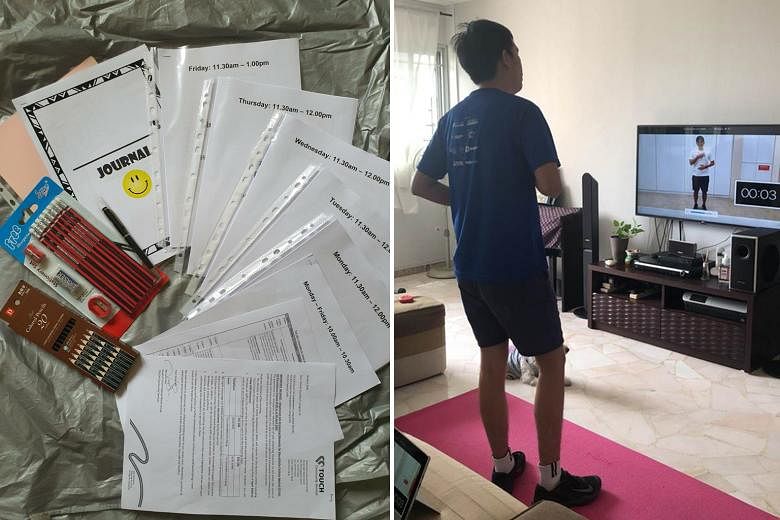With the circuit breaker measures in place, Ms Ng Jie Qi, who has intellectual disability, is unable to meet her friends from the Touch Centre for Independent Living (TCIL).
She is among many people with disabilities staying at home now that day activity centres are closed.
"I enjoy music and songs, and I like to dance. Now that I am at home all the time, I cannot meet my friends at (the centre) and dance and sing with them," said Ms Ng, 31.
TCIL, run by Touch Community Services at two locations, has been closed since April 3, affecting about 50 of its clients.
It is among many day activity centres for adults with special needs or disabilities across the island which are turning to different mediums to continue engaging these adults.
Since April 13, TCIL coaches, who teach daily living, social and pre-employment skills, have rolled out home-based classes, all of which include sign language.
Those who cannot attend the online sessions can use home-based training kits that include worksheets on topics taught online.
It is challenging for caregivers to look after people with intellectual disabilities who spend a prolonged time at home during this period, said Ms June Sim, Touch's head of the special needs group.
"Keeping our trainees meaningfully occupied at home helps to alleviate some of that stress," she said.
The online lessons cover topics such as money and self-care, and include exercise breaks with music.
Ms Ng said: "I like seeing my friends online now because I can sing and dance with them again."
The Alzheimer's Disease Association (ADA), which caters to those with dementia, has had to close its doors to some 700 clients across its seven day activity centres.
Its clients have been given activity packs such as Sudoku, word search and colouring.
ADA has also released a series of pre-recorded videos encouraging the elderly to exercise at home, said its chief executive Jason Foo. These have chalked up over 5,000 views. ADA has also loaned tablets to those without mobile device access.
One of its popular programmes, Memories Cafe, usually held at a cafe or restaurant, had earlier switched to livestreaming. While these have been halted, ADA is seeing a tenfold increase in views of its past broadcasts, said Mr Foo.
One loyal viewer is Madam Katherine Lim, 87, who has Alzheimer's and lives with her daughter Belinda Seet, 61, a part-time lecturer.
Ms Seet said: "My mum really loves the facilitators and misses them, so she has enjoyed watching the livestreams." Madam Lim has also been watching the exercise videos, following the moves every afternoon.
Mr Foo said: "It is already difficult for people in general to stay cooped up at home for 28 days. Imagine how stifling it will be for persons with dementia who need that social and mental interaction even more than others."
The Eden Centre for Adults has also provided its 88 clients, who have moderate to severe autism, with online exercise videos. Those who need live interaction and direct instructions get video calls from coaches, and those who can cook or bake are given recipes.
Mr Sarayanan Mariappa, its head of programmes (services for adults), said that during this period, greater effort is needed to keep the clients meaningfully engaged as not all are able to comprehend the serious consequences of not staying home.
Centres for those with physical disabilities are also adapting.
Cerebral Palsy Alliance Singapore (CPAS), whose day activity centre usually caters to 67 people, has provided videos of home-based exercises and is delivering equipment on loan to those who need it.
Those with cerebral palsy need regular exercise and stretching to strengthen their muscles and alleviate body sores caused by sitting in the same position for long hours, said CPAS' advocacy and marketing executive Sheena Teo.
"Performing these exercises allows them to improve their posture and blood circulation," she added.
One centre still open is the SPD day activity centre, for those whose parents work in essential services or whose elderly caregivers are too frail to take care of them.
It is one of several day activity centres designated by the Ministry of Social and Family Development to continue operating.
SPD chief executive officer Abhimanyau Pal said that for those staying at home, training officers will give them tasks and regularly check on their well-being.
"The training officers also encourage caregivers to let the clients play simple computer games at home... It is important for us to continue supporting our clients during this period so that there is minimal disruption to their rehabilitation regime."


